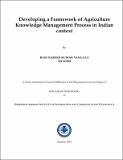Please use this identifier to cite or link to this item:
http://drsr.daiict.ac.in//handle/123456789/652| Title: | Developing a framework of agriculture knowledge management process in Indian context |
| Authors: | Banerjee, Asim Hiremath, B.N. Vangala, Ram Naresh Kumar |
| Keywords: | Knowledge management Information and communication technology (ICT) Milk cooperatives Structural equation modeling (SEM) |
| Issue Date: | 2018 |
| Publisher: | Dhirubhai Ambani Institute of Information and Communication Technology |
| Citation: | Ram Naresh Kumar Vangala(2017).Developing a framework of agriculture knowledge management process in Indian context.Dhirubhai Ambani Institute of Information and Communication Technology.xi, 127 p.(Acc.No: T00679) |
| Abstract: | In the current economy of global competition, many organizations are using knowledge as one of the means to gain sustainable competitive advantage. Knowledge is becoming a critical success factor for organizational performance. Knowledge management (KM) has evolved as a significant process for managing and exploiting organizational knowledge. However, the literature relating to KM in agricultural organizations is limited that to specific to Indian agricultural organization is too little. The sustainability of agriculture relies on the effective use of the organization's knowledge assets and resources. KM therefore has a major role in assisting Indian agricultural organizations to achieve performance excellence. The first objective of this study is to develop a context-aware framework to guide organizations in their efforts to manage knowledge (both tacit and explicit), and thus contribute to the development of organizations and farm communities in the global knowledge economy. To achieve the main goal, multiple case studies was conducted in Indian milk cooperatives and non-profit organizations. The analysis of the data reveals some local contextual issues and assumptions that are of importance in developing KM framework to support agricultural organizations. The framework constructed in the study embeds organizational variables - which includes farmers, experts, policy makers and information and communication technology (ICT) etc. It allows organizations to identify which knowledge processes needed to be addressed to achieve their goals. Like any other management initiative, implementing and measuring the KM process in agricultural organization is one of the important decisions. To measure the success or failure of the AKM process an organization also needs to develop a set of metrics. Thus, the second objective of the study is to proposed metrics for measuring effectiveness of AKM process in agricultural organizations. Literature review for the current research indicated that widely-accepted performance measures have been developed for organizations like the IT sector, Automobile etc. From the secondary resource data, the study has proposed 16 items or criteria for measuring AKM process in agricultural organizations. These 16 items can be determined by using quantitative or qualitative approaches. The third objective of the study was to determine the linkage between ICT and AKM processes in Indian agricultural organizations. To achieve this objective, a mixed method (qualitative and quantitative) approach was used. Responses from a sample of 283 respondents was collected from four different organizations. The analysis and hypothesis testing were implemented using structural equation modeling (SEM). The analysis shows that there is a significant and positive relationship between ICT and AKM processes. The approach used in this study may be replicated by managers to effectively use ICT in the AKM process of their organizations.They could also fine tune their existing ICT infrastructure and tools to achieve greater effectiveness of their AKM processes. This thesis contributes to ICTD and KM research and practice through the empirical findings, the design of AKM process framework, the development of metrics for measuring AKM process in agricultural organizations, and analytical tool developed for studying the relationship between ICT and AKM process in agricultural organizations. Its major contributes include development of AKM framework, and understanding of affect of ICT on AKM process in the context of Indian agriculture. |
| URI: | http://drsr.daiict.ac.in//handle/123456789/652 |
| Appears in Collections: | PhD Theses |
Files in This Item:
| File | Description | Size | Format | |
|---|---|---|---|---|
| 201121004.pdf | 201121004 | 913.13 kB | Adobe PDF |  View/Open |
Items in DSpace are protected by copyright, with all rights reserved, unless otherwise indicated.
